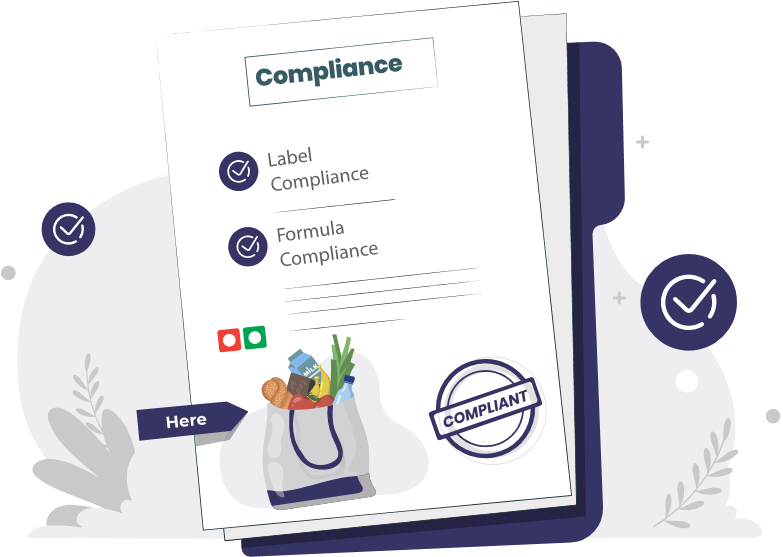FSSAI
FOOD PRODUCT COMPLIANCE
CliniExperts regulatory advisers help to evaluate all aspects from legal to regulatory compliance for food and beverages to meet all the requirement in the form directives, regulations, and standards stated by FSSAI.

Approval of any food product for ensuring its FSSAI compliance is a task that requires focus and has to be done with keeping the regulatory requirements in mind. At CliniExperts, our FSSAI compliance team is well-versed in the Food Product Compliance requirements to be followed for quick and easy approval of your product.
What Is FSSAI Compliance (Food Product Compliance)?
- What is the purpose of this service ?
The primary purpose of food product compliance is to ensure that the product formulation and labelling comply with the FSSAI norms.
- Who can apply for FSSAI Compliance?
Any importer, manufacturer, or food business operator involved in the distribution or storage of food products can apply for Product compliance.
- Which regulatory body regulates food Product compliance?
Regulatory bodies such as FSSAI and the other bodies (BIS, Tea Board, Legal Metrology, etc.), depending on the product type, govern the regulation of food compliance.
- How to ensure the product is in compliance with the FSSAI regulations?
The product is required to meet the formulation compliance pertaining to the ingredients and additives their quantities and limits. The product category must be interpreted accordingly that makes it factually appropriate. The labelling compliance then can be done accordingly as per the FSSAI laid down regulations for each of these parameters accordingly. The ancillary service is the lab testing that is required to ensure the product's safety for heavy metals, microbial & contaminants limits and also to check the quality parameters matches up to the FSSAI defined standards.
- How long does the entire process take?
To check whether the product is in compliance to the said norms under FSSAI usually takes ten working days. It may vary as per availability of the client as well as presence of appropriate lab test reports.
- What are the pre-requisites for food compliance?
Lab testing of product and safety analysis are two essential services that need to be done before going for compliance. It may however go parallelly as well.

Number of Check Points
There are 320+ checkpoints to be kept in mind for obtaining food product compliance in the fastest timeframe with minimal hindrance. These ensure that the product, formulation and label are all compliant with regulations laid down by the concerned authority. Few of them are listed below.
All the required ingredients and additives being used in a compliant manner as regards product category, quality and quantity.
The product’s label should have the correct non-veg or veg logo
The appropriate names, descriptions, and categories should be clearly mentioned
The product’s complete nutritional profile in the correct format should be included on the label
The FSSAI logo with the address of FSSAI, and license number should not be missed on the label
Proper labelling should be done for the ingredients, Its percentage added and any declarations
The label should mention any analogues, sweeteners, oils, polyols and caffeine correctly
The declaration and warnings for supplements should be stated on the label
The price (MRP), the batch number and dates should be stated
A significant caution should be taken for RDA compliance for the included nutrients in the product.
Why FSSAI Compliance (Food Product Compliance) Is Important
FSSAI compliance is an essential aspect for a Food business operator. It indicates that the product manufactured/imported/marketed is according to the standards and regulations of the country. Ensuring product compliance also avoids any legal actions or penalties for the food business operator. In addition, it also saves a lot of time and money towards establishing a reliable brand in the minds of the users.

Essential Tips
The Food business operator should keep a few points in mind for the ease of ensuring product compliance which include:
Mentioning all the ingredients and additives correctly
Keeping track that all the products should meet the quality and standards laid down by FSSAI
The food product’s labelling should comply with the Food Safety and Standards (Labelling and Display) Regulations, 2020
The list of the ingredients and additives in the product should be mentioned with proper quantities, on the label. The ingredients and additives must also comply with the guidelines laid down regarding quantity criteria for the specific categories
The changes in the formulation or labelling should be upto mark
Applicants are issued show cause notices or even penalized if the product released in the market is non-compliant.
Expert Advise
Our advice as decade old industry experts to all applicants is to make sure that all the ingredients, additives should be mentioned, with their exact quantities and functional roles up to the sub-ingredient or sub-component level for compliance with laid down rules.
Reformulation should be done up to a certain extent for certain ingredients or for value addition ingredients, that are non-compliant, to prevent the NSF route for approval.
The labels should be designed to include all the information exactly as per guidelines to prevent hindrances.
Frequently Asked Questions
What happens to a non-compliant product?
The provisions for offenses and penalties for non-compliant foods are as specified by the Food Act and include;
-
Tor using sub-standard food (applicable to the manufacturer, seller, storage, distributor, and importer), a penalty of 5 lakh is to be paid.
- Any misbranding of food or product (applicable t manufacturer, seller storage, distributor, and importer) – a penalty of 3 lakh Is to be paid.
- Using any misleading advertisement or false description for a product or nature or quality of substance (applicable to Publisher or any person involved in publishing), a penalty of 10 lakh is to be paid.

What is the date of enforcement for the Food Safety and Standards (Labelling and Display) Regulation, 2020?
The timeline for mandatory compliance with labelling display regulation as per the Food Safety and Standards (labelling and Display) Regulation, 2020has been extended to the 1st of July 2022.

Can a genetically modified (GM) organisms or their products be used for compliance?
No. currently, products/ingredients of GM origin are not permitted under FSSR. However, FSSAI is in the process of finalising the guidelines for the regulations and safety assessment of such foods. Once the guidelines are laid down by FSSAI compliance may be applicable for GM products as well.

Is Legal Metrology compliance mandatory for Food Products?
Yes, compliance with Legal metrology is necessary for all packaged food products and commodities.

Are there any acceptable variation tolerance limits during the sample analysis of a finished food product?
The regulation has stated that a limit of -10% variation can be accepted for the declared value of nutrients or any nutritional ingredients during the analysis. Variation beyond -10% will be liable to penalty.

